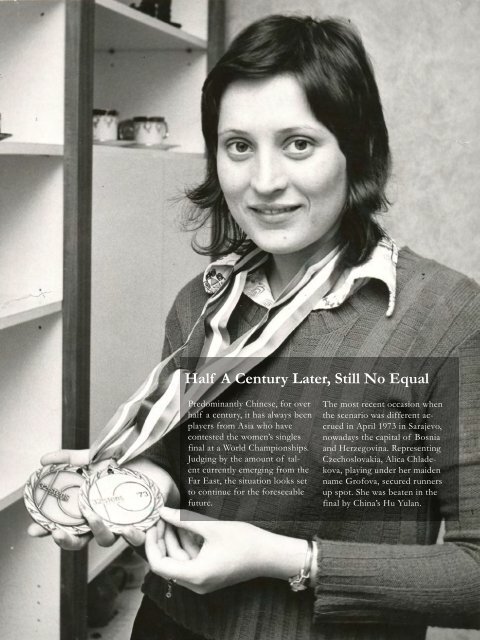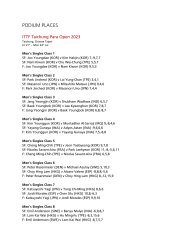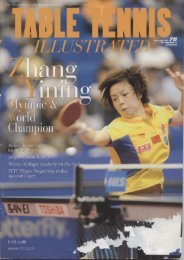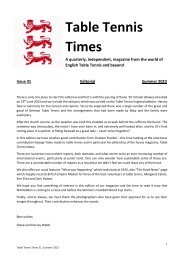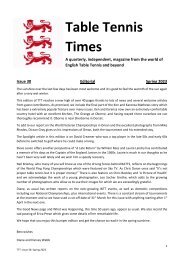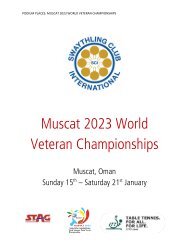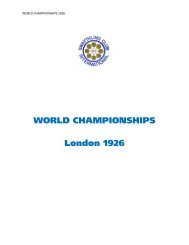Swaythling_Mag_112-1 (2023_04_26)
You also want an ePaper? Increase the reach of your titles
YUMPU automatically turns print PDFs into web optimized ePapers that Google loves.
At the time did we realise how<br />
great the achievement? In<br />
those day a European female<br />
player pressing for honours<br />
was not unusual.<br />
Prior to 1973, the only year in<br />
the history of the World Championships<br />
when a European<br />
player had not won a women’s<br />
singles medal was 1965 in<br />
Ljubljana. Conversely, since<br />
that date, only three non-Asian<br />
players, all from Europe, have<br />
gained a women’s singles<br />
podium finish. All bronze medallists,<br />
Tatiana Ferdman for the<br />
Soviet Union in 1975 in Calcutta,<br />
Romania’s Otilia Badescu<br />
in 1993 in Gothenburg and<br />
now two decades ago, Croatia’s<br />
Tamara Boros in 2003 in<br />
Paris.<br />
Medals gained at the European<br />
Youth Championships,<br />
notably junior girls’ team gold<br />
in partnership with Miloslava<br />
Polackova and Ilona Uhlikova<br />
in 1967 in Vejle and the following<br />
year in the city then known<br />
as Leningrad; in 1969 Alica<br />
made her debut at the World<br />
Championships in Munich.<br />
Alongside Ilona Vostova and<br />
Jitka Karlikova they secured<br />
women’s team bronze.<br />
It was an eye-opening tournament,<br />
a visit to another world!<br />
“There were vending machines<br />
everywhere. In our country,<br />
cola was not sold, it was<br />
rare for us, so we used it to<br />
quench our thirst”, smiled Alica.<br />
“When we couldn’t sleep<br />
in the evening, we were tired,<br />
coach Andreadis forbad us<br />
from drinking cola and ordered<br />
a small beer for dinner.<br />
It worked very well!”<br />
Award ceremony in 1975, organised<br />
by the Club of Slovak Journalists<br />
and the Slovak Central<br />
Committee of the Czechoslovak<br />
Association of Physical Education,<br />
Alica finished in third place.<br />
Half A Century Later, Still No Equal<br />
Predominantly Chinese, for over<br />
half a century, it has always been<br />
players from Asia who have<br />
contested the women’s singles<br />
final at a World Championships.<br />
Judging by the amount of talent<br />
currently emerging from the<br />
Far East, the situation looks set<br />
to continue for the foreseeable<br />
future.<br />
The most recent occasion when<br />
the scenario was different accrued<br />
in April 1973 in Sarajevo,<br />
nowadays the capital of Bosnia<br />
and Herzegovina. Representing<br />
Czechoslovakia, Alica Chladekova,<br />
playing under her maiden<br />
name Grofova, secured runners<br />
up spot. She was beaten in the<br />
final by China’s Hu Yulan.<br />
Modern day performances<br />
reflect the measure of the<br />
achievement, one that may<br />
never have accrued had it not<br />
been for advice from one of<br />
the greatest of the immediate<br />
post war era.<br />
“At first I played passively,<br />
with the occasional attack. It<br />
wasn’t until the 1966 European<br />
Youth Championships in<br />
Szombathely, Hungary, where<br />
then national team coach, Ivan<br />
Andreadis, advised my father<br />
that I should adopt a more attacking<br />
style,” Alica explained.<br />
“So, I became an attacking<br />
player; eventually, possessing<br />
one of the strongest forehands<br />
amongst female players.”<br />
In 1973 Alica was<br />
named best sportwoman in<br />
Slovakia<br />
Seated front row, second from left,<br />
Alica, a member of Czechoslovak<br />
team prior to 1965 European Youth<br />
Championships.<br />
4 - SWAYTHLING SWAYTHLING - 5


